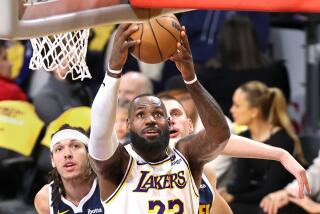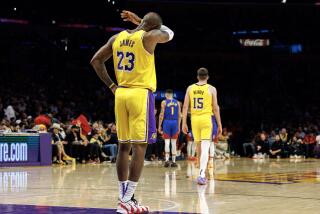Series Needs Intensity in Two Cities
- Share via
Because the Lakers and Portland Trail Blazers will readily admit they have trouble stopping each other, the Western Conference finals could be decided by the team that stops itself.
These two powerhouses, the class of the NBA this season, have been able to get by with a couple of subpar efforts earlier in the season.
There are too many flash-point plays that can change the course of a series--Scottie Pippen’s three-point basket to beat the Utah Jazz, Anthony Carter’s over-the-backboard shot against the Knicks, and Kobe Bryant’s buzzer-beater against Phoenix are a few recent examples--to simply let a game be decided by a lack of intensity.
That’s what has been so mystifying about the three Laker losses in the playoffs. At times when it has mattered most, their intensity has been at its lowest.
They could have ended their first-round series in Game 3 against Sacramento, when the Kings and their fans were docile and ready to be put to sleep.
But the Lakers let the Kings take control in the fourth quarter. Then, reenergized and with the volume cranked up in Arco Arena, the Kings took it to Lakers in Game 4.
Against the Suns, the Lakers gave up 71 points in the first half of what could have been a close-out Game 4.
“I think we learned our lesson in the Phoenix series,” Bryant said.
Actually, Bryant is one of the few Lakers who understands the concept of consistent effort all along. This is one area in which his youth is a positive, because he has no shortage of energy and enthusiasm.
It’s up to the rest of the team to find a similar energy reserve, to recognize that the methods that worked earlier in the year aren’t enough now.
What enabled the Lakers to compile a 67-15 record this season was an addiction to winning. When they reached the point in games where folding would be acceptable, they decided they weren’t having it and turned it around. Down in the second half, on the road, finishing up a trip . . . whatever the circumstances, the Lakers would find a way to put together a six- or 12-minute stretch of crisp basketball to take the game.
Sometimes that’s all it takes on a December night in Atlanta. The playoffs require a stronger effort over the full 48 minutes.
“Our execution is pretty good,” Coach Phil Jackson said. “We’re adjusting during the course of series, OK. I’m giving Cs and Bs to these things.
“Energy-wise, we pick it up in some games and play very, very high energy. Other games we have not been consistent enough in playoff games, with our energy. Those are some of the things I think we can improve on, and yet we’re doing well enough to be where we’re at.”
Perhaps their position in the conference finals and their formidable opponent will be enough to elicit more from the Lakers.
“I still know we’re going to have to exact a better effort in all of those areas,” Jackson said.
“It’s hard to muster that up every day. There’s a lot of things that go into that. But I think we’ll be able to develop that.”
Jackson’s face tightened into the perplexed expression of a student during finals week. No doubt, he was spoiled by the level of play Michael Jordan brought every night, especially during the playoffs.
You’ve heard of a coach losing his players? At times in these playoffs, it appeared the Lakers were on the verge of losing their coach. He was disappointed in their wasted trip to Sacramento and angered by their treadmill imitation in Game 4 of the Phoenix series.
But looking around the league it’s clear that the phenomenon extends to all players and all teams. It doesn’t make sense to anyone.
Listen to the exasperated tones Alonzo Mourning and Pat Riley used after Miami’s inconsistent play in the Eastern Conference semifinals. It even took the disciplined Utah Jazz four games to realize they’d better play hard against the athletically superior Trail Blazers.
Nothing was more mind-boggling than the dramatic swings between Games 4 and 5 of the Laker-Sun series.
“It’s hard to imagine a game like Sunday and Phoenix playing a game like they played . . . on Tuesday,” Jackson said.
“Likewise, after the Portland and Utah game on Sunday, it’s hard to imagine that Portland played that flat like they did in a need situation [Tuesday] night. It’s hard to consistently pull a group together and [have] energy without knowing all the things that go into it.”
As poorly as the Trail Blazers played in Game 4, they still were only one three-point basket away from sending it to overtime. And they won Game 5 despite shooting 33% in the first half.
If the Lakers take nothing else from their own Game 5, it’s that effort can cover other deficiencies.
“We played a highly energetic game and yet were inept in many areas of the game,” Jackson said. “The energy of what we were doing obviously affected Phoenix.”
Especially when that effort translates into eight blocked shots.
One of the auxiliary scoreboards in the Rose Garden keeps track of every effort statistic, including steals and charges drawn.
Chances are, one glance at that will render the main scoreboard unnecessary.
*
J.A. Adande can be reached at his e-mail address: j.a.adande@latimes.com.
More to Read
All things Lakers, all the time.
Get all the Lakers news you need in Dan Woike's weekly newsletter.
You may occasionally receive promotional content from the Los Angeles Times.







